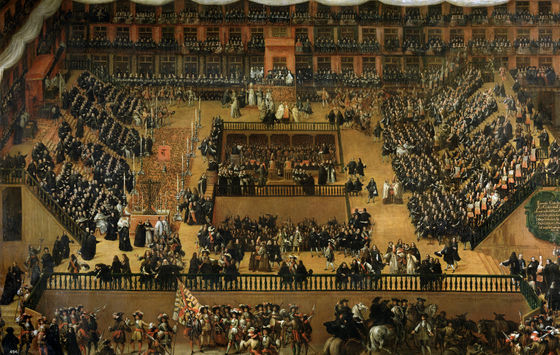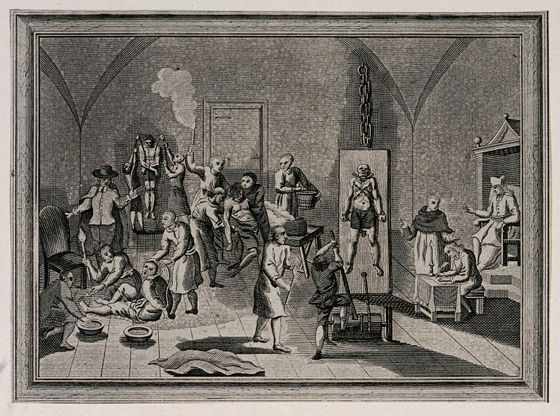The 'Inquisition' hundreds of years ago is the cause of the 'unreliability' of educational background and relationships.

From the Roman Empire to the Crusades to the
Extraordinarily, the effects of the Spanish Inquisition linger to this day
https://theconversation.com/extraordinarily-the-effects-of-the-spanish-inquisition-linger-to-this-day-166170
The Inquisition is a system that has existed in Catholic churches since the Middle Ages and 'trials those who are suspected of having unbelievable teachings (= heretics).' The Inquisition is said to have been particularly fierce in Spain since the 15th century. This is because Fernando V, who took a Christian purification policy after the completion of the Reconquista of the Christian state's reconquest of the Iberian Peninsula, said, 'Although it seems to be devoted to Christianity, it is actually their own. The reason is that he tried to eliminate 'the people who keep their faith.' Such people were called Converso (Jews who converted to Catholicism) or Morisco (Muslims who converted to Catholicism).
One of the characteristics of the Inquisition is that the records are kept in detail. According to the record, the subject of judgment is all levels of Spanish society, and the execution area is the entire country. The punishment ranged from light stakes to burning at the stake, and the ruling was communicated in public ceremonies, usually in front of the public, so it is said that it remained widely known to the public for any crime.

A new study by Jordi Vidal-Robert and colleagues at the University of Sydney on the Spanish Inquisition looks at the current situation in areas where the Spanish Inquisition was once fierce. Vidal-Robert et al. Compared the regional 'inquisition strength' calculated from a total of 67,521 recorded inquisitions with the economic and cultural levels of each region. For the economy, the GDP for each municipality calculated from satellite images taken at night was used, and for the culture, the results of a questionnaire survey conducted by the Spanish Center for Sociology were used. The method of calculating GDP from satellite images was adopted because the method of 'calculating GDP per capita from administrative data' was not permitted in compliance in Spain, and it has a strong correlation with GDP per capita and is an economy. It is said that it replaced the night light, which is widely used as a surrogate index for performance.
As a result of comparison by Vidal-Robert et al., Municipalities that have no record of any inquisition and those whose inquisition strength was the bottom third have the highest GDP per capita in modern times, and the inquisition strength is high. It was found that the middle third of the municipalities had significantly lower incomes, and the top third of the inquisitions had significantly lower levels of economic activity. The median GDP per capita was 19,450 euros (about 2.55 million yen) in the cities, towns and villages where there were no inquisitions, but 18,000 euros (about 2.36 million yen) in the cities, towns and villages with the highest inquisition strength. He said he was interrupting.

Similar results were obtained for education and trust among people. Comparing the cities, towns and villages with zero inquisitions and those with moderate inquisitions, the latter had a 5.6% decrease in the population receiving higher education. Regarding the sense of trust, the inquisition was fierce in the degree of trust in humans shown in the question 'Do you think humans deserve trust in general? Or do you think it is better to be careful?' It is said that it will decrease as the area increases. Also, regarding religion, it seems that the more intense the Inquisition, the higher the attendance rate at the church even today.
Vidal-Robert and colleagues responded to the expected counter-argument that the Inquisition was originally more prevalent in poorer areas, because the Inquisition was profitable from fines and confiscated property. It is reasonable to think that the richer the area, the more prosperous it was. ' Regarding the economy, 'If the Inquisition had not been held in Spain, the GDP would have been 4.1% higher,' and regarding education, 'The Inquisition specifically targeted the educated and literate middle class.' Therefore, the impact on the intellectual climate such as Spanish culture and science is particularly great, 'he said at the end.' Even now, about 200 years after the complete abolition of the Spanish Inquisition, the affected places are still affected. It seems to be poor, religious, poorly educated, and unreliable. '
Related Posts:
in Note, Posted by darkhorse_log







